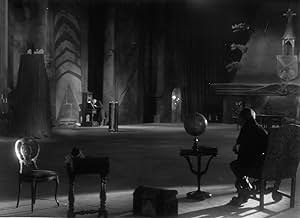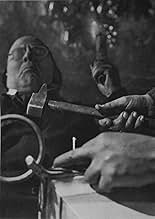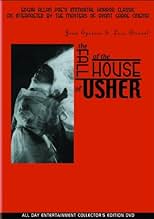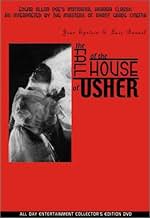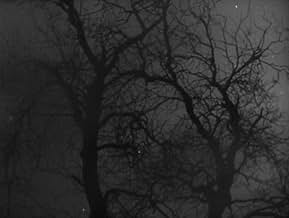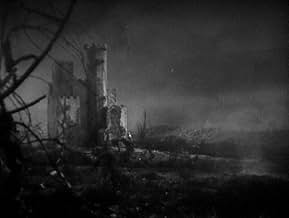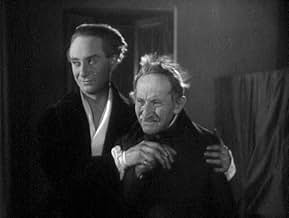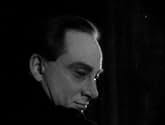IMDb रेटिंग
7.2/10
4.9 हज़ार
आपकी रेटिंग
अपनी भाषा में प्लॉट जोड़ेंAllan visits the sinister Usher family mansion, where his friend Roderick is painting a portrait of his sickly wife Madeline. The portrait seems to be draining the life out of Madeline, slow... सभी पढ़ेंAllan visits the sinister Usher family mansion, where his friend Roderick is painting a portrait of his sickly wife Madeline. The portrait seems to be draining the life out of Madeline, slowly leading to her death.Allan visits the sinister Usher family mansion, where his friend Roderick is painting a portrait of his sickly wife Madeline. The portrait seems to be draining the life out of Madeline, slowly leading to her death.
- निर्देशक
- लेखक
- स्टार
फ़ीचर्ड समीक्षाएं
This memorable adaptation of Edgar Allan Poe's "The Fall of the House of Usher" is particularly impressive in its use of visuals and in the macabre, disorienting atmosphere that it creates, which fits in well with the story. Jean Epstein made some rather significant changes to the story, but as a movie it all works very well.
The story changes the central relationship between Roderick and Madeline, and in so doing discards some of Poe's themes, but adds some new ones of its own. Likewise there are other differences as the story unfolds, but Epstein had his own consistent conception of the possibilities in the story, so that it's neither better nor worse than Poe's idea, just different - they are both creative and fascinating conceptions in their own way.
The settings and visual effects are very effective in establishing the atmosphere, and in setting off some of the themes of the story. Some of them, such as the enormous array of flickering candles by which Roderick works, are used as recurring images, with surprisingly haunting results. The pace with which the images come at the viewer is also used as part of the effect. It's quite a distinctive accomplishment, and it's a movie that you won't forget for a while.
The story changes the central relationship between Roderick and Madeline, and in so doing discards some of Poe's themes, but adds some new ones of its own. Likewise there are other differences as the story unfolds, but Epstein had his own consistent conception of the possibilities in the story, so that it's neither better nor worse than Poe's idea, just different - they are both creative and fascinating conceptions in their own way.
The settings and visual effects are very effective in establishing the atmosphere, and in setting off some of the themes of the story. Some of them, such as the enormous array of flickering candles by which Roderick works, are used as recurring images, with surprisingly haunting results. The pace with which the images come at the viewer is also used as part of the effect. It's quite a distinctive accomplishment, and it's a movie that you won't forget for a while.
I had the chance to see this film about 20 years ago and it's still quite fresh in my mind (if you knew me you'd find this very unusual). I still remember how I was wrapping myself up during the course of the film as I was feeling colder and colder - it was a summer night, mind you.
The plot sticks tightly to the original story and it shows France's affinity with Edgar Allan Poe since it was the great Charles Beaudelaire himself who translated Poe's work into French.
The film manages to create an unusual sense of discomfort unlike most classic horror films where the settings etc. result more in a feeling of (uneasy) cosiness. The insanity in Roderick Usher's face is utterly believable as well as the parts of the other characters. What tops it all up is the constant draught in the mansion. Wall hangings are steadily moving and bits of paper and dust are blowing through the corridors. Hence the above mentioned feeling of physical coldness.
All I can say is I need to see this film again and I would be grateful if anyone could point me in the right direction (Quelq'un en France, peut-etre?).
The plot sticks tightly to the original story and it shows France's affinity with Edgar Allan Poe since it was the great Charles Beaudelaire himself who translated Poe's work into French.
The film manages to create an unusual sense of discomfort unlike most classic horror films where the settings etc. result more in a feeling of (uneasy) cosiness. The insanity in Roderick Usher's face is utterly believable as well as the parts of the other characters. What tops it all up is the constant draught in the mansion. Wall hangings are steadily moving and bits of paper and dust are blowing through the corridors. Hence the above mentioned feeling of physical coldness.
All I can say is I need to see this film again and I would be grateful if anyone could point me in the right direction (Quelq'un en France, peut-etre?).
Wow! Words cannot describe how absolutely magical this film is, but I will try. Its not often that a film will truly captivate me from moment one as this one has, especially in the world of silent film. Its been a long time since I've been glued to the screen in complete rapture. Granted, I like the silent medium and of course I respect it, but usually I watch them as a piece of film history; I see them for what they are and judge them only amongst their peers: other silent films. But this silent film is like no other! There were many times when I felt as though if Guy Maddin were to make a actual serious film this would be it. Anyone who has seen 'Cowards Bend The Knee' or 'Saddest Music In The World' will know what I'm referring to. Throughout the film I kept thinking that it looked "new" and was made to look old. Some of the special effects such as the swirling fog were just mesmerizing so much so that I found myself wondering why in our modern day we haven't done something so simple yet effective (at least as compared to the films I've experienced).
Even the score that they created for it was incredible. There were some scenes in the beginning of the film, especially ones where Allan was approaching the house, that I didn't think quite fit, but for the rest of the 95% of the film it went along with the action of the film perfectly.
While everything in the film is as close to perfect as film gets, I must point out the acting was so well done as to almost bring me to tears. I cant quite explain how that is possible, but it is. Each tiny emotion shows through so remarkably well. I really would love to commend the actor who played Roderick Usher for his wonderful display. I even feel right in comparing his acting to the likes of the female lead in 'The Passion Of Joan Of Arc' -- and thats hard to beat!
Oh, and the cinematography! Its absolutely impeccable! And I'm not just saying that due to the fact that "its the best they could do back then". It really could rival any modern day film in that regard. It makes me miss shots of a large looming building from down below instead of the aerial helicopter shots most films use now; so macabre and eerily inviting. This film was definitely ahead of its time thats for sure.
I'm not sure how much a screenplay translates to a silent film, but whatever/however Bunuel contributed, it definitely worked. Even though there weren't any overtly surrealistic things going on, you could definitely smell the Bunuel in it. The film is like a dream that you don't want to wake up from even though at its heart it is a nightmare.
Even the score that they created for it was incredible. There were some scenes in the beginning of the film, especially ones where Allan was approaching the house, that I didn't think quite fit, but for the rest of the 95% of the film it went along with the action of the film perfectly.
While everything in the film is as close to perfect as film gets, I must point out the acting was so well done as to almost bring me to tears. I cant quite explain how that is possible, but it is. Each tiny emotion shows through so remarkably well. I really would love to commend the actor who played Roderick Usher for his wonderful display. I even feel right in comparing his acting to the likes of the female lead in 'The Passion Of Joan Of Arc' -- and thats hard to beat!
Oh, and the cinematography! Its absolutely impeccable! And I'm not just saying that due to the fact that "its the best they could do back then". It really could rival any modern day film in that regard. It makes me miss shots of a large looming building from down below instead of the aerial helicopter shots most films use now; so macabre and eerily inviting. This film was definitely ahead of its time thats for sure.
I'm not sure how much a screenplay translates to a silent film, but whatever/however Bunuel contributed, it definitely worked. Even though there weren't any overtly surrealistic things going on, you could definitely smell the Bunuel in it. The film is like a dream that you don't want to wake up from even though at its heart it is a nightmare.
As was inevitable, movies of the silent era depended on their imagery in a way that became less important after the introduction of sound. During the same time period there were a number of hugely significant art movements that would influence the relatively new medium of cinema. Art trends such as cubism, dada, expressionism and surrealism had enormous impact on films of the time. The Fall of the House of Usher is a good example of a film based on 19th century literature but brought to the screen via the artistic sensibilities of the day, namely expressionism and surrealism. Because of this, like its peers such as The Cabinet of Dr. Caligari and Nosferatu, it has attained a timeless quality and it will always remain a fascinating art-horror film.
The plot-line such that it is, is about a man named Allan who visits his friend Roderick Usher at his remote mansion. Usher lives with his sick wife Madeline, who suffers from some mysterious unknown disease. He is obsessed in painting a portrait of her. She dies and Usher, unable to accept it, descends into madness.
The tone is definitely downbeat and this is reflected by the gloomy haunting imagery used throughout. The strikingly inventive visuals escalate as the film progresses as a way of reflecting Roderick Usher's journey into insanity. Billowing curtains, close-ups of a giant pendulum, a haunting painting of Usher's wife, a moon-lit trip to the mausoleum and swirling mist are just some of the details captured. The film is overloaded in creepy Gothic atmosphere. Production design is excellent, with the grounds of the mansion populated with dead trees and swirling mist, while the interior has enormously high ceilinged rooms decorated with mirrors, curtains and Gothic furniture. In keeping with the film's artistic bent, everything is photographed quite excellently with many close-ups and unusual angles. The overall feeling of the film is that of a fever-dream which is very much in keeping with the central character's damaged state of mind.
In the best silent films, the storyline is very much secondary to the ambiance. The Fall of the House of Usher is no different and is one of the greatest silent horror films. It's an often quite stunning mood piece and comes highly recommended.
The plot-line such that it is, is about a man named Allan who visits his friend Roderick Usher at his remote mansion. Usher lives with his sick wife Madeline, who suffers from some mysterious unknown disease. He is obsessed in painting a portrait of her. She dies and Usher, unable to accept it, descends into madness.
The tone is definitely downbeat and this is reflected by the gloomy haunting imagery used throughout. The strikingly inventive visuals escalate as the film progresses as a way of reflecting Roderick Usher's journey into insanity. Billowing curtains, close-ups of a giant pendulum, a haunting painting of Usher's wife, a moon-lit trip to the mausoleum and swirling mist are just some of the details captured. The film is overloaded in creepy Gothic atmosphere. Production design is excellent, with the grounds of the mansion populated with dead trees and swirling mist, while the interior has enormously high ceilinged rooms decorated with mirrors, curtains and Gothic furniture. In keeping with the film's artistic bent, everything is photographed quite excellently with many close-ups and unusual angles. The overall feeling of the film is that of a fever-dream which is very much in keeping with the central character's damaged state of mind.
In the best silent films, the storyline is very much secondary to the ambiance. The Fall of the House of Usher is no different and is one of the greatest silent horror films. It's an often quite stunning mood piece and comes highly recommended.
First and foremost: I love the tale of "House of Usher", regardless of which film version, and I try to encourage as many people as humanly possible to check out this haunting story of agony and Gothic damnation
So, I swear, if one more person replies me with: "Usher?
Oh, you mean the R&B singer? Yeah, he's cool", then I swear I will go Edgar Allan Poe on his/her ass! Thank you.
Admittedly I'm not much of an art connoisseur, but I reckon this silent classic is pure and genuine art! It's a stunningly beautiful, haunting, surreal and absorbing impressionistic interpretation of Poe's short story. The plot is undeniably subsequent to the atmosphere and choreography, and I actually don't recognize the storyline from the other versions I've seen. In the other versions, for example the awesome Roger Corman production starring the almighty Vincent Price, the Usher kinship is cursed and continuously being punished for the crimes committed by their evil ancestors. Here, it's actually just Sir Roderick Usher who's obsessed with painting a portrait of his lovely wife Madeleine, only The nearer the painting comes to completion, the more his wife weakens due to a strange illness. After her death and burial service, Sir Roderick becomes increasingly mad with the restless ghost of his Madeleine still prowling through the house. The story is often confusion and open for various interpretations, but the wholesome is just downright visually stunning! Director Jean Epstein, with the more than noticeable influence of his young and upcoming assistant director Louis Buñuel, generates an atmosphere that is morbid, depressing and hypnotic from start to finish and multiple sequences are hauntingly surreal; like the funeral march and the storm. I watched the 1997 restored version, during a special film festival where there was a professional pianist providing live musical guidance, and it was one of the most culturally engaged moments of my life. Art like this will surely survive for yet another hundred years.
Admittedly I'm not much of an art connoisseur, but I reckon this silent classic is pure and genuine art! It's a stunningly beautiful, haunting, surreal and absorbing impressionistic interpretation of Poe's short story. The plot is undeniably subsequent to the atmosphere and choreography, and I actually don't recognize the storyline from the other versions I've seen. In the other versions, for example the awesome Roger Corman production starring the almighty Vincent Price, the Usher kinship is cursed and continuously being punished for the crimes committed by their evil ancestors. Here, it's actually just Sir Roderick Usher who's obsessed with painting a portrait of his lovely wife Madeleine, only The nearer the painting comes to completion, the more his wife weakens due to a strange illness. After her death and burial service, Sir Roderick becomes increasingly mad with the restless ghost of his Madeleine still prowling through the house. The story is often confusion and open for various interpretations, but the wholesome is just downright visually stunning! Director Jean Epstein, with the more than noticeable influence of his young and upcoming assistant director Louis Buñuel, generates an atmosphere that is morbid, depressing and hypnotic from start to finish and multiple sequences are hauntingly surreal; like the funeral march and the storm. I watched the 1997 restored version, during a special film festival where there was a professional pianist providing live musical guidance, and it was one of the most culturally engaged moments of my life. Art like this will surely survive for yet another hundred years.
क्या आपको पता है
- ट्रिवियाLuis Buñuel, who was Assistant Director, quit the picture after clashing with producer/director Jean Epstein over Epstein's decision to basically ignore Edgar Allan Poe's story.
- कनेक्शनEdited into Histoire(s) du cinéma: Une vague nouvelle (1999)
टॉप पसंद
रेटिंग देने के लिए साइन-इन करें और वैयक्तिकृत सुझावों के लिए वॉचलिस्ट करें
- How long is The Fall of the House of Usher?Alexa द्वारा संचालित
विवरण
- रिलीज़ की तारीख़
- कंट्री ऑफ़ ओरिजिन
- भाषा
- इस रूप में भी जाना जाता है
- The Fall of the House of Usher
- फ़िल्माने की जगहें
- उत्पादन कंपनी
- IMDbPro पर और कंपनी क्रेडिट देखें
- चलने की अवधि
- 1 घं 12 मि(72 min)
- रंग
- ध्वनि मिश्रण
- पक्ष अनुपात
- 1.33 : 1
इस पेज में योगदान दें
किसी बदलाव का सुझाव दें या अनुपलब्ध कॉन्टेंट जोड़ें

